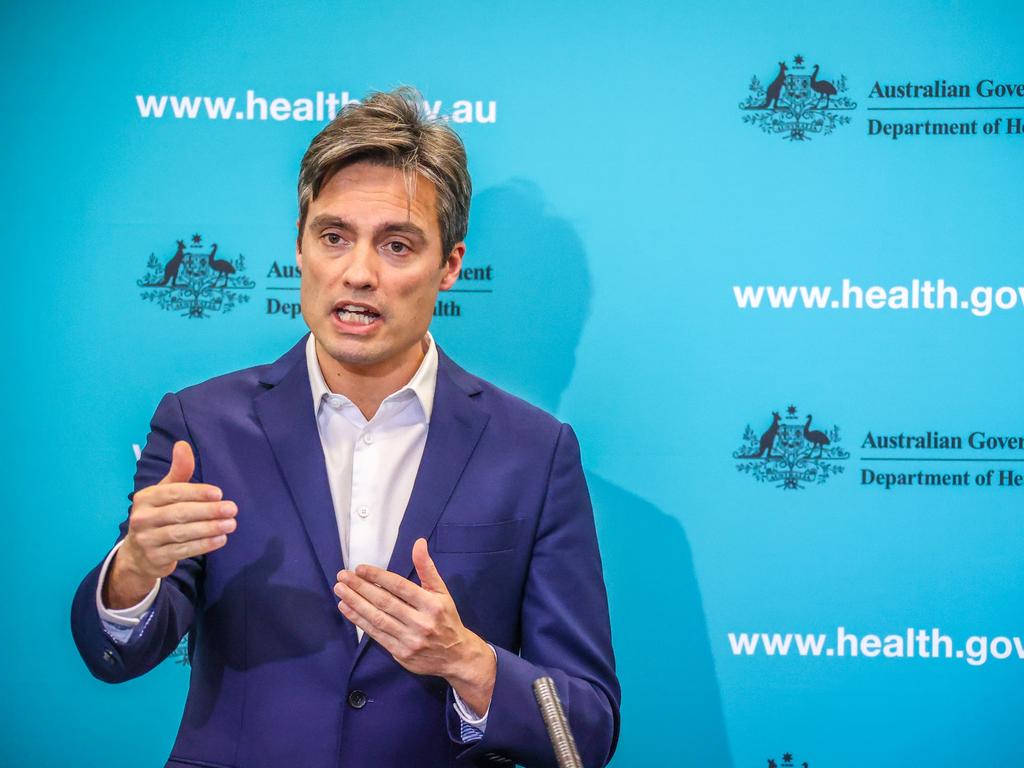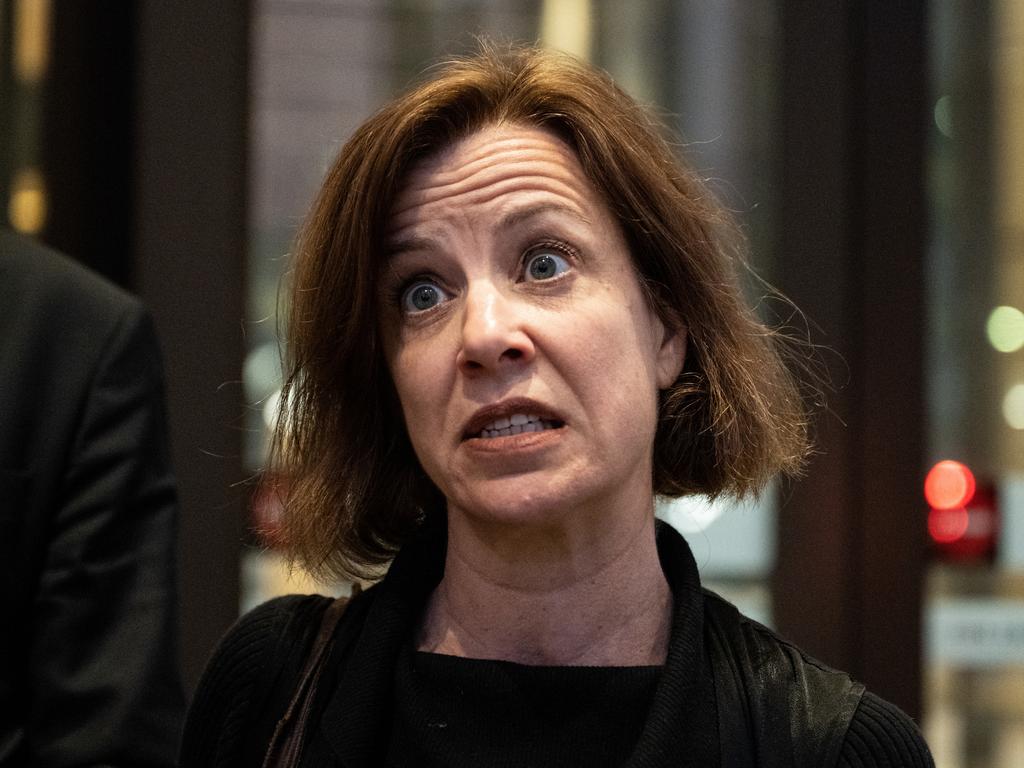Courage and conviction in Perrottet’s Promised Land
His actions delivering on his words, the NSW Premier is a shining light for conservatives.

Which Australian political leader said this to an audience last week?
Clue: not a Labor leader. Another clue: it wasn’t Scott Morrison when he spoke to corporate types at the Sydney Institute dinner last Monday evening. Even loyal Liberals privately described it as a pedestrian address. Morrison threw in a splash of John Howard, a smidge of Edmund Burke to try to boost his brand as a Liberal. As reboots go, Team Morrison must be hoping this nostalgic pitch to be the small-government guy is more convincing than the flop revival of Sex and the City.
Final clue: it wasn’t SA Premier Steven Marshall either. Maybe that didn’t need saying. Marshall, after all, has shown that he is more likely the person being led than the person doing the leading.
It was NSW Premier Dominic Perrottet, who drew on Moses for leadership inspiration. While Morrison was trying to impress an elite Sydney crowd, Perrottet appeared on the first episode of Alan Jones’s new digital program that aired on Monday night. The program website crashed that night from the sheer weight of people on their devices – around 350,000 of them – trying to tune into an unfiltered Jones.
By the time the show aired half an hour late, viewers were rewarded with a rarity in politics, an interview with a conservative leader who talks with authenticity about his values, and even in his short time in office, then backs up the talk with action.

Since becoming Premier 2½ months ago, Perrottet has proven himself to be the sole political leader in Australia willing to step in front of, rather than hide behind, health bureaucrats. He has resisted their calls for Covid restrictions to stay, opening the state up this week, even as Omicron numbers grow, to unvaccinated Australians, removing the need for masks and QR check-in in more places. While the single remit of a health bureaucrat is safety at all costs, a premier’s job is bigger, more complicated.
And early signs are promising for those who believe that phrase, “living with Covid”, must be more than idle chatter from leaders trying to placate people who have done the right thing for 18 months – locked inside their country, they stayed home, worked from home, checked in, wore masks, home-schooled their kids, kept their distance from friends and family, waited patiently while the PM told us that vaccinations were not a race, then they got vaccinated, and now they’re getting boostered.
Perrottet has a chance to show the country what living with Covid looks like. It’s risky business, especially in a country where the federal government decided to keep the country shut off from the rest of the world for longer than any other country bar North Korea, where that closed international border had a political domino effect with states and territories closing their borders too, until concentric circles locking us in were reduced in places to a radius of 5km. For the first time in more than 100 years, our federation was wholly dismantled, and still is, if you live in Western Australia.
Perrottet is the sole leader, state or federal, most likely to hold his nerve in the face of Omicron. Compare South Australia, where that state’s Liberal Premier, led by his health bureaucrats, recently imposed 14 days’ quarantine on anyone deemed a close contact of a person with Covid. That killed Christmas plans for thousands of people. Cricketer Michael Neser will be very grateful that Marshall, not Perrottet, is the Premier of SA. Were it Perrottet, Neser would be 12th man.
Marshall’s decision this week to reduce the isolation period to seven days reveals his jittery approach to governing. Next week, he might jump back to 14 days.
Queensland has been just as flippity. On Monday afternoon, Queensland Health ordered two plane loads of passengers into 14 days of self-isolation after a person on both flights tested positive for Covid-19. A public uproar led to a backflip from that state’s Health Minister, Yvette D’Ath. Her absurd explanation for the 14-day period, that the government needed to do a ring-a-round of other states first, is not a serious answer.
There was a national cabinet meeting for discussions between states just three days earlier. Politicians and health bureaucrats have had many months to build hospital capacity, to plan for new variants, to work out what living with Covid means.
While Marshall is prone to the jitters, and the Palaszczuk government sniffed the wind to reduce self-isolation to seven days, Perrottet has shown a different kind of leadership. Dare one call it more solidly liberal-minded, headed one way, towards living with Covid.
This week, Perrottet did exactly what he spoke to Jones about on Monday night. Collating advice from myriad sources – health, economic, some common sense too – he made a decision he thinks is right, narrowing the definition of a close contact and then articulated that as part of living with Covid, especially over Christmas. In a bid to prevent thousands of people from spending Christmas alone, in isolation, a fully vaccinated close contact will only have to isolate until they receive a negative PCR result. Only household close contacts and close contacts in some settings identified by NSW Health will have to isolate for seven days and follow usual PCR test rules.
Perrottet is up against resistance. Not just the usual hysteria at the ABC: Wednesday’s PM program didn’t bother to present a single person in favour of the state’s eased restrictions during its vox pop segment. Some health experts are upset they have been become part of a mix of advice.
For so long as the NSW Premier stands firm about opening the state and genuinely living with Covid, so, presumably, will Morrison. Just as the Prime Minister hitched his wagon to former NSW Liberal premier Gladys Berejiklian’s handling of the pandemic, he is doing the same with Perrottet.
Maybe it will work. But Morrison’s claim to wanting the country to live with Covid wasn’t always solid. When Berejiklian encouraged national cabinet to start educating the public about living with Covid by ignoring case numbers, focusing instead on hospitalisation and ICU numbers, Morrison was silent. The PM was even less enamoured about living with Covid, when, in one of Perrottet’s first decisions, the new Premier announced he would open Sydney International airport to double-vaccinated arrivals.
Morrison jumped, publicly knocking back Perrottet’s plan the same day, announcing his priority was getting Australians home first. His public power play fell flat for thousands of Australians who felt the pain of the Prime Minister shutting Australian citizens out of the country for longer than was decent or necessary. Many noticed that his default position was not opening up the country.
Put simply, whereas Morrison talks a good game as a Liberal leader wanting the country to live with Covid, his instincts and actions don’t match his words. Maybe that’s why his Monday night address about wanting to be a small-government PM, not a busybody meddler, wasn’t convincing either.
That, and according to the latest mid-year budget update released on Thursday, the $16bn in new spending the Morrison government will announce anytime up until the next federal election, thus reducing the potential to improve the budget bottom line over the medium term. The latest OECD survey of Australia points out: “The immediate fiscal response (to Covid-19) was one of the largest in the OECD. It also dwarfed the 7¼ per cent of GDP stimulus injected during the global financial crisis, which at the time was itself large compared with other countries.”
Perrottet’s position is high-risk, high-reward. It is also rare and courageous leadership in this country. The contrast with his SA Liberal counterpart’s low-risk, low-reward position of hiding behind a health bureaucrat is stark.
There is an obvious danger if Morrison stands too close to Perrottet. The contrast between the state Liberal leader and the federal one might also become more apparent. So far, the newest Liberal leader is matching his words with actions. The transactional Morrison, in power for much longer, is yet to do that. Perhaps Marshall is a safer contrast; his mediocrity makes Morrison look better than he is.







“If you’re Moses taking people to the Promised Land and you ask them every day if they want to keep walking, they will probably say no. Your role as a political leader is to look at advice, and then make the decision that you believe is the right decision. The public may disagree with you from time to time, but the way to build hope and confidence, and instil that in people, is to do what is right and articulate clearly why we are making those decisions.”